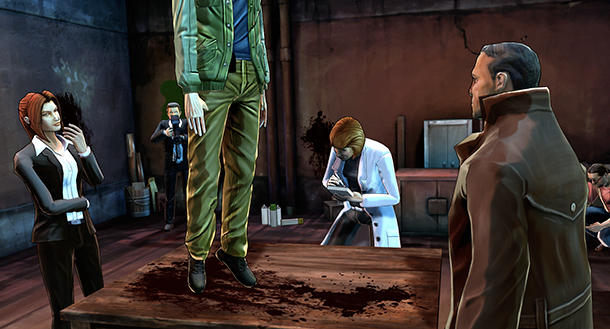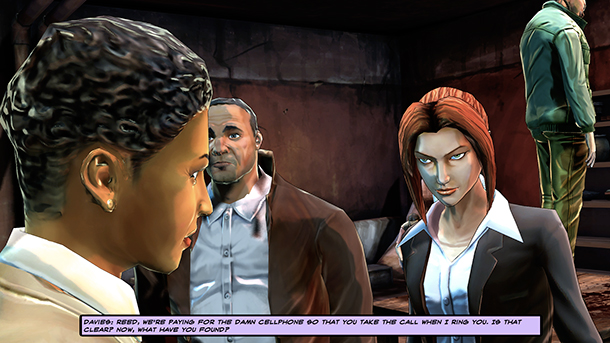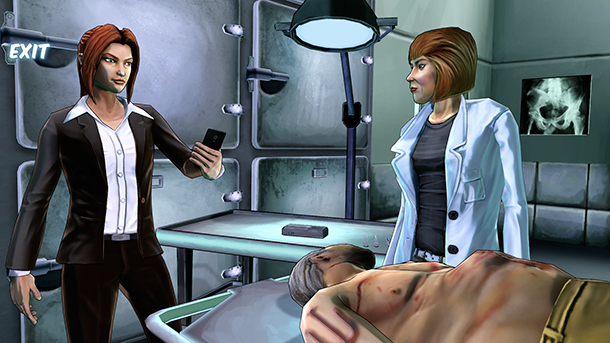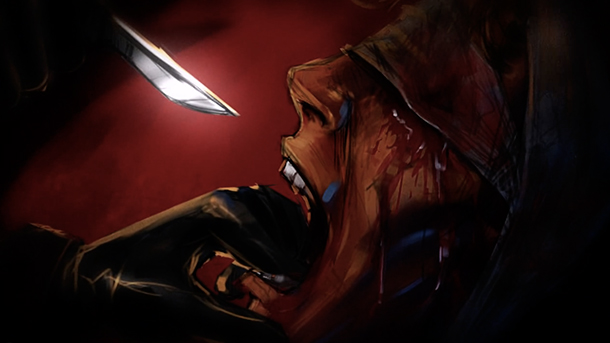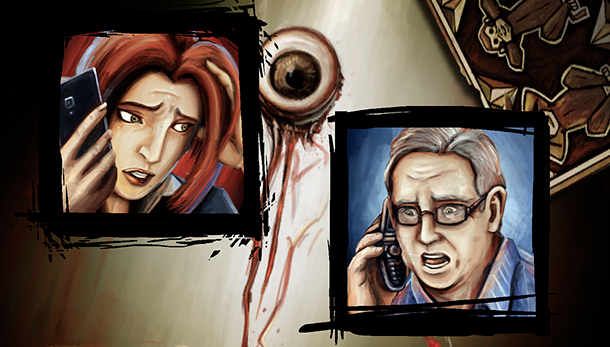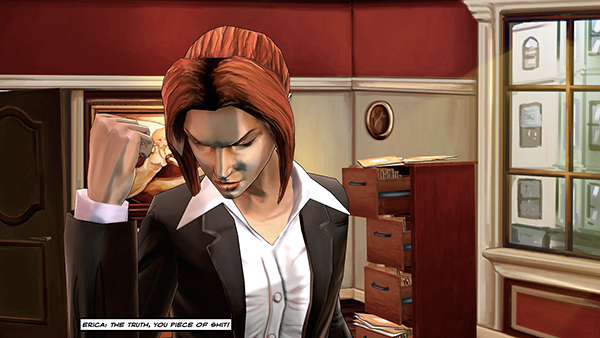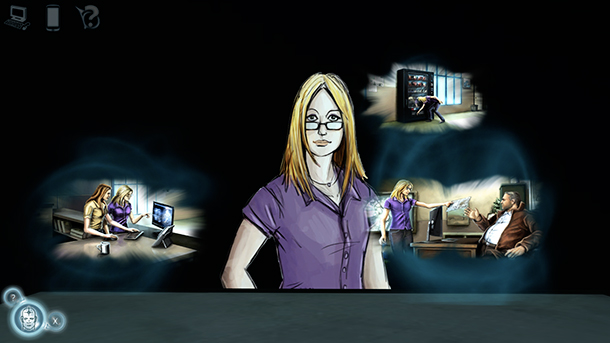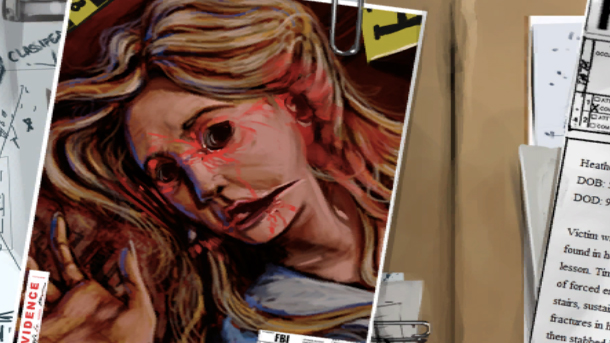Wot I Think: Cognition, Episodes 1 & 2
More 'Sinister' than 'Dexter'
Cognition is a four part psychic serial thriller about the hunt for a psycho serial killer. Episode 1: The Hangman launched in October. Episode 2: The Wise Monkey lands today. That makes this the half-way point, and so the perfect time to take a look and see if this investigation is worth signing up for. We sent Richard to catch some killers. Here's Wot He Thinks...
Given that it's a game whose obvious inspirations include Saw, saying that Cognition has its heart in the right place rather suggests it might be in the second drawer down, next to the severed spinal cords. It's a game with definite issues, especially in tone. It's also one with a genuine love and, more importantly, appreciation for the classic adventure games it takes its cues from, and a Kickstarted budget allowing for stunning indie production values. Also, unlike certain other episodic games, the wait between these chapters was only three months.
Cognition is the story of FBI agent Erica Reed - a red-haired psychic solving crimes with her ghostly partner Joey the power of 'post-cognition'. This seemingly simple ability to get helpful flashbacks from objects soon becomes a full-on Swiss Army Knife of psionics, including recreating crime scenes, and helping people recover faded or repressed memories.
Handy stuff for any FBI agent on the trail of a serial killer or four.
Both these opening episodes have a different target, as from the look of it will the third, though it's no secret that Erica's real target is the Cain Killer - the guy who gives the final chapter his name, and the Jigsaw style trapmaster responsible for her brother Scott's death during the first episode's atmospheric prologue. Oddly, that happens even if you save him, at which point he just drops dead of inexplicable plot-related causes, and Cognition pretty much just hopes you didn't notice. No matter though. It's not as if serial killers are known for playing fair.
This prologue provides a pretty good snapshot of Cognition's attitude - not a gorefest by any stretch, but not a game afraid to embrace the darkness of a world where people get hanged to ensure maximum agony before expiring, innocents get eyes carved from their heads for no good reason, and serial killers can capriciously craft challenges of flesh with near complete impunity. It's an adventure that knows that the shudder of a knife about to slice an eyeball is usually worse than seeing it happen, with graphic novel cut-scenes that paint the disturbing content in unpleasant ways rather than relishing the change to draw it in full.
At the same time though... diplomatically, it can be pretty silly. Scratch that. Things can get really silly, and it's not a good idea to think about the details too much. As an example, here's an extract from the prologue of the Cognition novelisation I'm currently pitching.
The man who most called Cain, but secretly thought of as the Hilariously Overcomplicated Killer, peered into the tomb. The woman Reed was there at the control panel, still bleeding at the knees from the sadistic spike trap he'd made her subject herself to in the graveyard. He gazed at her; admiring that pretty red hair. Red... ooh, like Reed, he'd just spotted that... all slick with delicious sweat from straining her nascent psychic powers in a futile bid to save her brother from needlessly showy crossbow bolt related death.
Why crossbows? Ah, they would ask themselves that many times, staring in the cruel night. They would never know that he'd just found them on eBay and been inspired. How life worked out. It could so easily have been a cuddly hippo stuffed with Semtex.
Cain smiled, teeth glistening in the unnecessary but rather attractive candlelight. Finally. Finally all his unnecessarily time-consuming plans were coming to fruition. The buried clues. The sinister graffiti on the tomb. The sacrificial altar inside, and the short but effective electrical engineering course required to set this fiendish trap for his sibling prey. Now, all that remained was to kill Reed in her moment of final despair. He reached for his gun and- fuck! Gun! How had he gone and left it on the dresser? What a monumental arse!
They've not gotten back to me yet. Their spam filters must be on the fritz.
I kid, obviously, and to be fair this tends to be a problem for games that take themselves this seriously - a kind of in-built pressure valve. My favourite is that the way that the hint system (which isn't really necessary - these are easy games) involves Erica text-messaging her cop father for his expert advice on anything from breaking into her boss' office to defusing traps. You've really got to pity the guy, repeatedly getting messages like "Hey, Dad, I'm in a serial killer's lair and I'm totally having one of my derpy days. Any ideas? LOL."
A big part of the problem is the villains being too keen to show off. As Episode 2 demonstrates, a crazy person with a knife is a more visceral threat than any mastermind with lots of fancy toys. The spike trap in the intro just about gets away with its ridiculous nature because of how much it hurts, and the integration of Erica's pained screams with having to keep turning the wheel causing them. It's a close run thing though, and if Cognition needs to focus on one thing as its story gets more serious, it's preventing its horror descending any further into camp "Mwah-ha-ha!" level villainy. The Cain Killer at least is already pretty much there.
Mostly though, the atmosphere works. Cognition is smart enough to space out its more horrible moments so as to retain the shock value, and ground its magical elements to keep the horror on a human level. Erica and her colleagues for instance don't have deep relationships, but they do have a sense of history. She and her first partner (in flagrant violation of current indie adventure laws, played by neither Abe Goldfarb nor Logan Cunningham), have a respect that's obviously been earned, while her semi-boyfriend Sully hits a kind of safe level of well-meaning blandness that you can understand Erica being reluctant to get too excited about. Only her boss really drops the ball on the FBI side, coming across as schizophrenic rather than layered.
Civilians and suspects are a mixed bunch, with a couple played for comedy but most relatively straight. In part of the tonal confusion I mentioned earlier, they're from TV police procedurals like Castle and Bones rather than serial killer stories. In the second episode, one even starts singing. It's a jarring transition from the opening of the prologue, but done reasonably as long as you're expecting it. The nasty stuff and real monsters are almost all book-ended in both chapters, which feels like a deliberate bid to stop it getting too familiar. If so, it works well enough, while still saving a couple of unpleasant surprises to keep you on your toes.
While that lighter tonal shift may be a touch disappointing given the premise of the series, the writing is very good so far - give or take a few head-scratchers, and misjudged attempts at humour. There's nothing wrong with characters being snarky or doing jokes in a situation like this, as long as it feels like it's actually coming from them. Here, it's really jarring to suddenly get hit in the face with a Quest For Glory joke out of absolutely nowhere, see FBI computers display official crime categories for vampires and werewolves in a universe where they don't exist, and have this be the second time Erica's voice actress' band The Scarlet Furies has been given a clue cameo in an adventure game. Wrong time, wrong place, wrong narrative genre.
These quibbles aside, the dialogue is strong, the characters have definite voices, and the plotting good well, even with some major eye-rollers when Erica and co forget they're under time pressure or that "backup" is a thing. The first episode's mystery suffers from having so much to set up, but the second hits the ground running with a great opener and well-executed twists.
It's immediately obvious that Gabriel Knight is a very prominent branch on Cognition's family tree, even without knowing that Jane Jensen was its story consultant and her step-daughter plays Erica. The music too, while not composed by Robert Holmes, also follows suit with its piano pieces and other shared vibes. This familiarity is a good thing though, with Cognition openly acknowledging its obvious inspirations, but not at the cost of its own voice and attitude. It's a much nastier, darker game than any of the Gabriel Knights, and certainly Gray Matter, but in a way that works for it and helps carve out its own niche. With a serrated scalpel.
The rest of the production is impressive too - admittedly, with a mandatory "for an indie game" grafted on the side. No, you certainly don't get the best quality textures and animation, and the scrappy 3D models do clash with the hand-painted backgrounds. At the same time though, it's high-resolution, has a ton of incredibly detailed 2D and 3D design, for the most part looks great, the music fits well, and about half an hour in, the joins stop being noticeable. Cognition may not be a big AAA production, but the money it had to work with has been well spent - it's a very pretty, very atmospheric game whose pieces come together more than acceptably.
Big dramatic moments are almost all saved for graphic novel style panels that look good in their own right, and spare the 3D models too much acting - a definite advantage, proven by the moments when they have to try - and the style is very effective. There's usually just enough animation to convey the sense of movement and flow while retaining a textured look, with the style allowing for emotion, and as much pain as the game needs to invoke.
Needless to say, most of the unpleasantness happens in these shots - and some of them are very unpleasant indeed. There are plenty of others for conversations though, quieter moments, scene-setting introductions and artistic touches that make these scenes feel like a firm part of the aesthetic rather than just a cheap way to throw together some cut-scenes.
Erica herself feels a little underdeveloped though. She's not a bad character by any means, and certainly not a blank. She has proper motivation, her psychic powers are well implemented, and the game takes enough time out to explore her fears and feelings about exactly what she's walking into. That said, while she's seen as hot-headed in universe (and surprising nobody, her office nickname is "Red"), it tends to come across as immaturity and inexperience instead, to the point that she often seems to forget she's an FBI agent with authority on her side.
She can also come across as a real ass at times, with the game oddly choosing to have her constantly berated for things we didn't see her do or that the ignorant complainer has no way of knowing are more complicated, while shrugging off things like her stealing flowers from a stranger's grave. The game's not oblivious to her flaws, and there may be good reasons for some of the characters to tolerate them that have yet to be revealed, but still, any sane FBI branch director would have unceremoniously fired this woman years ago.
Probably her biggest problem though isn't her fault, but the fact that she rarely has a partner to bounce off. That inherently restricts many of her reactions to just-the-facts narration, as well as making absolutely no logical sense. One of the two guys she works with knows about and completely supports her psychic powers, and even if the big twist is that he's really the Cain Killer or something, it's silly in the here and now to see him spend an episode sitting behind a desk doing paperwork while she walks alone into serial killers' lairs to play mind games.
Oh, and speaking of silly; yes, this is childish and even unfair, but by Episode 2 a number of Erica's character traits were really making me laugh inappropriately. I know "wicked" is valid Boston slang, but an FBI agent saying things like "She'll be wicked pissed!" still makes her sound like a naughty teenager to my English ears. That feeling only got worse when she started breaking out "Oh SNAP!" type gestures at suspects... and sometimes, well...
Her psychic powers claw back a lot of this ground though, giving her unique skills that are well-woven into the story and believably handled - at least, as much as 'psychic FBI agent' is ever going to be. At any point in the game you can switch into Cognition mode, which adds a filter to the screen and lights up areas of interest. Cognition is apparently a plot-sensitive power though, and only ever flags up areas of direct relevance to the job at hand. Despite Erica's Sookie Stackhouse complaints that she can't even touch a guy without things getting dodgy, the only time they seem to get out of control is when she gets particularly frazzled.
Initially, you can only get flashbacks, but that soon advances to offer personal character moments, back-stories, and a couple of very dark puzzles. The one at the end of Episode 2 is particularly clever, really embracing the series' creepy premise in a way that only these powers and this kind of story can enable. It's a bit long though. Have a notepad ready.
The one clunker of the set is the first episode's Regression power, which involves fixing memories by changing things like the colour of a woman's dress and the sign on the wall. It's one of those puzzles that looks fine on paper, even clever, but in practice is immensely tedious and takes forever - especially coming after a deliberately time-wasting puzzle. Thankfully, as of Episode 2 Regression just pops up the necessary flashbacks directly.
The puzzles in general are much tighter too. Episode 1 is surprisingly long, while Episode 2 is a little too short, but the main reason for the difference is that the first is padded out with some absolute drivel. A witness who won't talk to Erica until he's been given three different foods. Silliness like a gadget that lets you look through paint, but only when you give it a magic colour code. Worst, while both games suffer from a lack of pace in their middle act, a good third of Episode 1 is spent actively avoiding advancing the plot in favour of running variations on the theme of "Erica Reed's Colleagues Are A Bunch Of Obstructive Dicksacks".
As with the padding and psychic irritations, Episode 2 tones that down dramatically. It's not as ambitious an episode, but it's a more grounded one, and the clear attempts to sand down the rough edges bode well for the rest of the series. It still dips into silliness on occasion, but builds on the plot in interesting ways and makes good use of what's been established. As long as the series doesn't escalate too much, and the gore never goes all the way to grand guignol levels, the next couple of episodes should be equally entertaining dark little adventures.
Episodic games are always a gamble, and Cognition is far from flawless. It's a series that anyone who remembers serious adventures as fondly as the comedy ones should definitely check out though. When it slips up, it's usually at least funny about it. The rest of the time, it ducks in and out of actually feeling like the thriller it promises to be, but has more than enough edge to its design when it really counts. It's an unashamedly old-school take on the genre rather than a reinvention, with everything that implies for good and bad. I'm definitely looking forward to playing more though, and seeing where the story goes when the next episode lands.
Cognition Episodes 1 and 2 are out now. You don't want to skip straight to the second, it's got its own focus, but is far from a self-contained story. A Season Pass covering all four episodes is available for $30, with individual episodes costing $10 each. For the next day or so, you can also snag Episode 1 for whatever price you like over at IndieGameStand.


